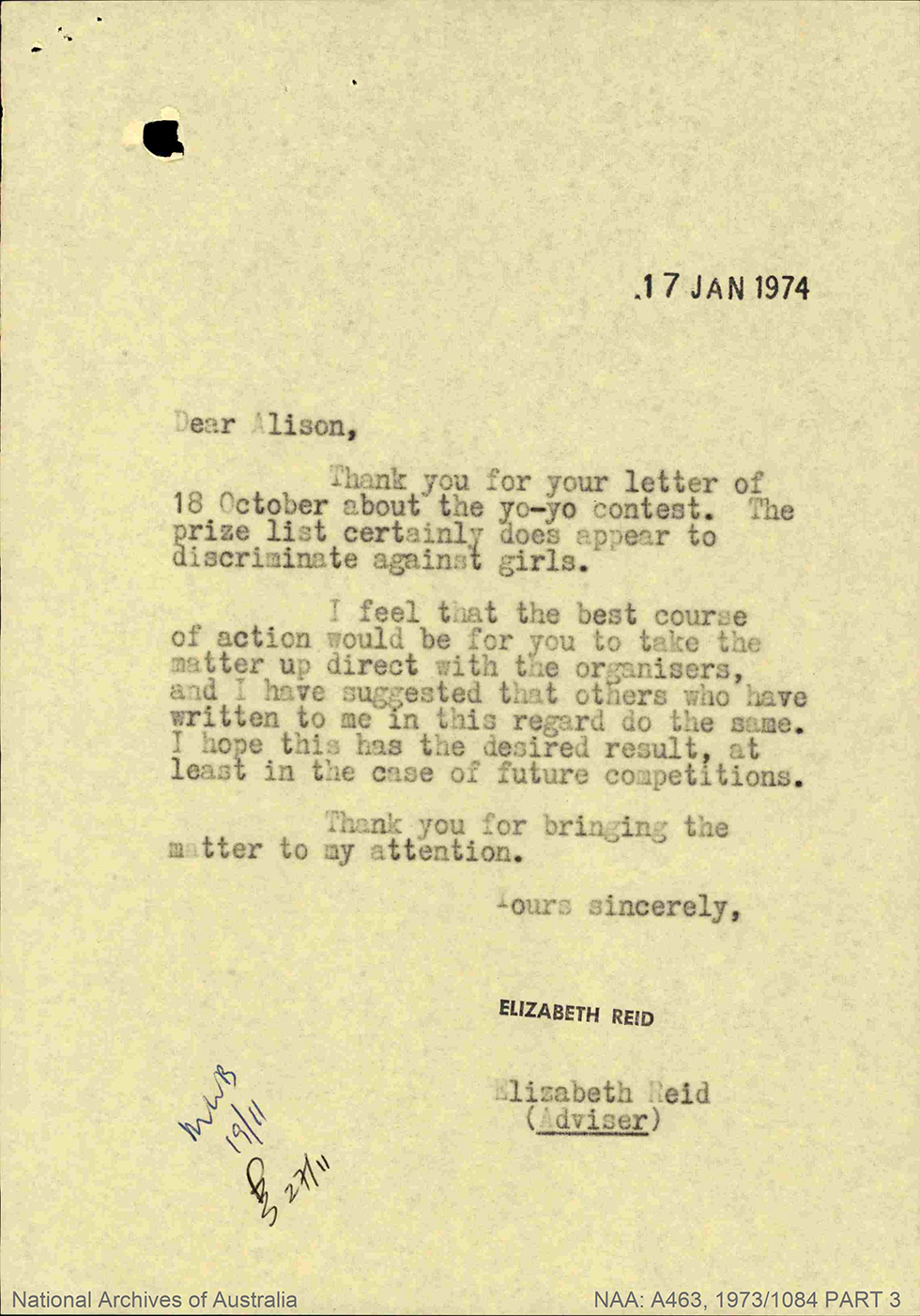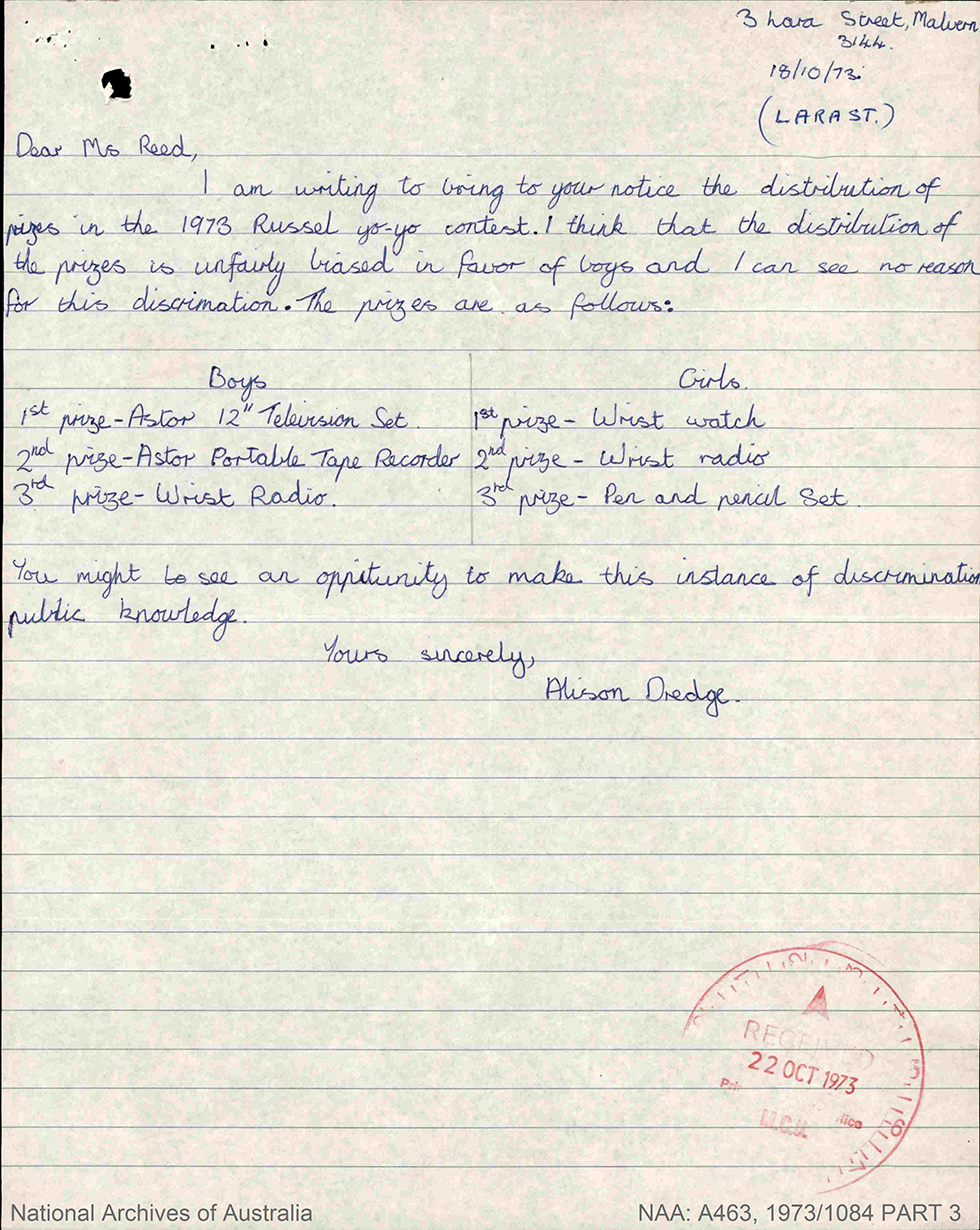

Aboriginal and Torres Strait Islander people should be aware that the National Archives' website and collection contain the names, images and voices of people who have died.
Some records include terms and views that are not appropriate today. They reflect the period in which they were created and are not the views of the National Archives.



[Page 1.]
17 JAN 1974
Dear Alison,
Thank you for your letter of 18 October about the yo-yo contest. The prize list certainly does appear to discriminate against girls.
I feel that the best course of action would be for you to take the matter up direct with the organisers, and I have suggested that others who have written to me in this regard do the same. I hope this has the desired result, at least in the case of future competitions.
Thank you for bringing the matter to my attention.
Yours sincerely,
[stamped:] Elizabeth Reid
Elizabeth Reid
[underlined:] (Adviser)
[handwritten, blue ink:
WMB
19/11]
[handwritten, black ink, different hand:
[initial illegible]
3 27/11]
[Page 2.]
[All text is handwritten in blue ink.]
3 Lara Street, Malvern
3144
18/10/73.
(LARA ST)
Dear Ms Reed,
I am writing to bring to your notice the distribution of prizes in the 1973 Russel yo-yo contest. I think that the distribution of the prizes is unfairly biased in favour of boys and I can see no reason for this discrimination. The prizes are as follows:
[Prizes are written in two columns, boys on the left and girls on the right.]
Boys
1st prize – Astor 12" Television Set
2nd prize – Astor portable tape recorder
3rd prize – Wrist radio
Girls
1st prize – Wrist watch
2nd prize – Wrist radio
3rd prize – Pen and pencil set
You might to see an oppitunity [sic] to make this instance of discrimination public knowledge.
Yours sincerely,
Alison Dredge.
[Stamp, red ink reads: 'Received 22 OCT 1973'.]
This record is a letter written to Elizabeth Reid, the first ever advisor to the Australian Prime Minister on women's issues. A young person, Alison Dredge, wrote to Elizabeth Reid to complain of discrimination in the awarding of boys' and girls' prizes in a yoyo competition.
The prizes offered to boys and girls in the competition were as follows:
Boys
1st Prize – Astor 12" television set
2nd Prize – Astor portable tape recorder
3rd Prize – wrist radio
Girls
1st prize – wrist watch
2nd prize – wrist radio
3rd prize – pen and pencil set
Alison received a response from the office of Elizabeth Reid acknowledging that the distribution of prizes was discriminatory, and recommending that 'the best course of action would be for you to take the matter up direct with the organisers.' Our records do not show what Alison decided to do after receiving this response.
Elizabeth Reid was appointed Women's Advisor to the Prime Minister in 1972. Her job was to give the prime minister, Gough Whitlam, advice on issues impacting Australian women. Elizabeth Reid was the first woman to hold a role like hers in Australia and the world.
During her time as Women's Advisor, Elizabeth Reid received many letters like this record. In fact, she received more mail than any member of the government besides Gough Whitlam. At the time, the entire Australian House of Representatives was made up of men. It is likely that many women and girls chose to write to Elizabeth Reid rather than their local member of parliament because they saw her as representing themselves and their interests.
Elizabeth Reid worked as Women's Advisor to the Prime Minister from 1973 – 1975. The impact of her time in the role is still felt today. Her advice saw progress in many areas of women's rights, including no-fault divorce, the funding of women's refuges, health centres, community childcare, access to contraception, and single mother’s benefit schemes.
Learn how to interpret primary sources, use our collection and more.
